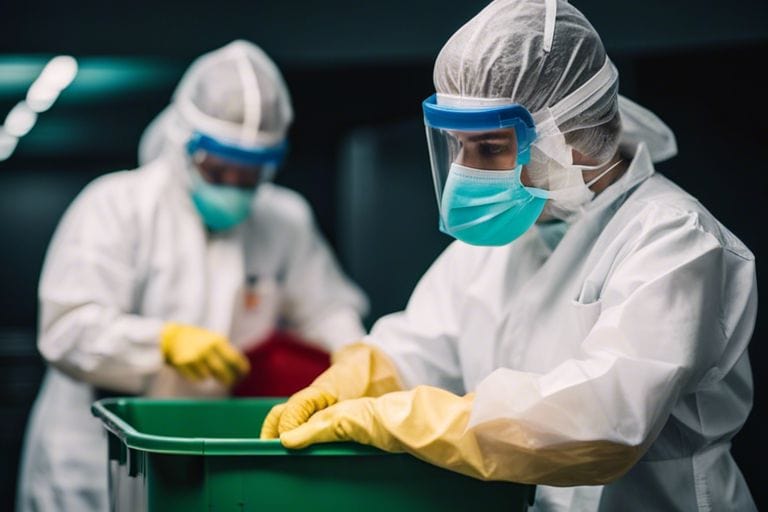It is crucial for healthcare workers to be vigilant and take necessary precautions when handling waste disposal in medical settings. Exposure to hazardous materials can pose serious risks to their health and safety. By following proper protocols and utilizing protective equipment such as gloves, masks, and gowns, healthcare workers can minimize the potential for contamination and infections. This informative guide will outline key strategies and best practices to ensure the safety of healthcare workers during waste disposal tasks.
Understanding Healthcare Waste
Types of Healthcare Waste
For healthcare workers, understanding the different types of healthcare waste is crucial for proper disposal. The main categories include infectious waste, hazardous waste, radioactive waste, general waste, and sharps waste. Each type requires specific handling procedures to prevent contamination and ensure safety. The classification of waste is important in guiding healthcare facilities on the appropriate waste disposal methods.
| Infectious Waste | Hazardous Waste |
| Radioactive Waste | General Waste |
| Sharps Waste |
Risks Associated with Healthcare Waste
Healthcare workers face various risks when dealing with healthcare waste, including exposure to infectious agents, needlestick injuries, chemical hazards, and radiation exposure. These hazards can lead to serious health consequences if proper precautions are not taken. Understanding and mitigating these risks are important for protecting the well-being of healthcare workers and preventing the spread of infections within healthcare settings.
For instance, needlestick injuries are a common risk associated with handling sharps waste. These injuries can result in transmission of bloodborne pathogens such as HIV and hepatitis B and C. It is crucial for healthcare workers to use appropriate personal protective equipment (PPE) and follow proper disposal protocols to minimize the risk of exposure.
Protective Measures and Equipment
Personal Protective Equipment (PPE)
Now, when it comes to handling healthcare waste, personal protective equipment (PPE) is important for safeguarding healthcare workers. PPE includes gloves, gowns, masks, and eye protection. These items create a barrier between the healthcare worker and potentially infectious materials, reducing the risk of exposure to pathogens.
Safe Handling and Disposal Protocols
Now, understanding safe handling and disposal protocols is crucial for healthcare workers involved in waste management. Following proper protocols ensures that infectious waste is handled and disposed of correctly, minimizing the risk of contamination and infection. Healthcare workers must be trained on how to segregate different types of waste, use the right containers, and follow specific disposal guidelines to prevent harm to themselves, patients, and the environment.
Training and Compliance
Importance of Training for Healthcare Workers
Keep healthcare workers safe during waste disposal by ensuring they receive proper training. Training plays a crucial role in equipping workers with the necessary knowledge and skills to handle various types of medical waste safely and effectively. It also ensures that they understand the risks associated with improper waste disposal and the importance of compliance with regulations.
Regulations and Standards Governing Waste Disposal
For compliance with waste disposal regulations and standards, healthcare workers must adhere to strict guidelines set forth by regulatory bodies such as the Occupational Safety and Health Administration (OSHA) and the Environmental Protection Agency (EPA). Regulations cover the proper segregation, packaging, labeling, and disposal of different types of medical waste to prevent contamination and protect both the environment and public health.

Facility Protocols and Best Practices
Your Adherence to safety practices and risks associated with healthcare waste management is crucial in healthcare settings. Healthcare facilities must uphold strict protocols to ensure the safety of healthcare workers and the general public.
Developing a Waste Management Plan
Management of healthcare waste begins with developing a comprehensive waste management plan. This plan should outline proper segregation, handling, storage, transportation, and disposal of different types of waste generated in healthcare facilities. Regular training sessions and audits are crucial to ensure staff adherence to the waste management plan.
Emergency Procedures for Exposure and Spills
Exposure to hazardous materials and spills can pose serious risks to healthcare workers. For instance, in case of exposure to blood or bodily fluids, immediate steps should be taken to wash the exposed area thoroughly and seek medical attention. Proper disposal of contaminated materials and decontamination of the affected area are critical to prevent the spread of infections.
Having clear guidelines and access to personal protective equipment can significantly reduce the risks associated with exposure and spills, ensuring the safety of healthcare workers and patients.
To wrap up
Considering all points mentioned above, it is evident that healthcare workers play a critical role in protecting themselves during waste disposal by following proper procedures and protocols. By utilizing personal protective equipment, segregating waste at the source, and adhering to guidelines for safe disposal, healthcare workers can significantly reduce the risk of exposure to harmful pathogens. It is imperative that healthcare facilities provide adequate training and resources to ensure the safety of their workers while managing medical waste. Ultimately, a combination of education, vigilance, and strict adherence to protocols is imperative in safeguarding the well-being of healthcare workers during waste disposal processes.
FAQ
Q: Why is it important for healthcare workers to protect themselves during waste disposal?
A: Healthcare workers need to protect themselves during waste disposal to prevent exposure to potentially infectious materials and reduce the risk of contracting diseases.
Q: What are some recommended measures for healthcare workers to protect themselves during waste disposal?
A: Healthcare workers should wear appropriate personal protective equipment (PPE) such as gloves, gowns, masks, and goggles. They should also follow proper handling and disposal procedures as per guidelines to minimize the risk of exposure.
Q: How can healthcare workers stay safe while handling and disposing of waste materials?
A: Healthcare workers can stay safe by receiving proper training on waste disposal protocols, ensuring all waste is sorted and disposed of correctly, and regularly washing their hands before and after handling any waste material.




